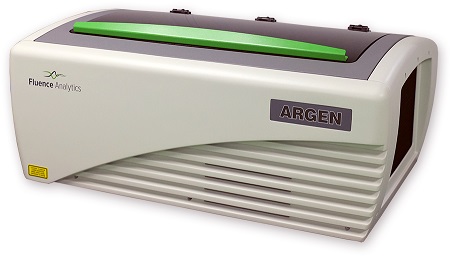
ARGEN is a benchtop lab instrument that enables a smart and rapid approach to therapeutic biopolymer development. The static light scattering platform addresses key challenges in biopharmaceutical R&D.
• Simulate stress conditions, like temperature changes and stirring, to immediately see how a formulation will respond.
• Monitor biopolymer stability in situ and in real-time.
• Test and compare multiple formulations in parallel, reducing the number of iterations required to reach optimal stability conditions.
• Predict aggregation and degradation propensities early, catching problems before they arise.
• Evaluate shelf-life stability at low temperatures with long-term stability testing.
These features and ARGEN’s real-time approach have helped biopharma companies around the world effectively develop stable biologics in a more efficient manner.
A primary concern with biopolymers is their propensity to become unstable over time. This can occur due to many factors and can render a biopharmaceutical ineffective or even harmful to a patient. ARGEN is equipped with static light scattering detection that is exquisitely sensitive to changes in weight average molecular weight. This means that formulation development teams can detect the early onset of instability, aggregation, degradation and particle formation. With this insight, researchers can significantly reduce the time it takes to identify optimal stability conditions.
Determining kinetics of oligomeric state transitions are pivotal in identifying the early onset of aggregation or degradation during drug discovery and formulation development processes. Unlike conventional methods, ARGEN is exquisitely sensitive to changes in weight average molecular weight. This permits the user to identify the early onset of instability or “time to dimer,” as well as the formation of higher order species in situ and in real-time.
ARGEN’s capability to determine these kinetics offers insights that are not possible with conventional methods like SEC and GPC.
Biopolymers encounter various forms of stress during processing resulting from filtration, thermal fluctuations, and shear stress associated with stirring or shaking. Understanding and characterizing the impacts of these different modes of stress provides insight into the stability of therapeutic biopolymers and their ability to remain viable during purification, manufacturing and parenteral administration.
Each sample cell within ARGEN is equipped with a magnetic stepper motor which couples to a micro stir bar at the bottom of the cuvette to simulate perturbations experienced during bioprocessing. Additionally, Yokogawa Fluence Analytics manufactures a propriety overhead stirring cuvette system for noncontact, overhead stirring experiments. These features permit ARGEN users to establish a comprehensive stability landscape and accelerate the development of new formulations.
The ability to analyze up to eight samples in parallel significantly accelerates the data collection process. By employing a Design of Experiment (DOE) format, ARGEN allows for an extensive exploration of stability parameters across a large spectrum of samples. This has proven to expedite the formulation development pathway to identify the optimal candidate.
Stability at low temperatures is critical for many biopharma applications, especially in situations where samples may be reconstituted and stored under refrigerated conditions. ARGEN is suitable for long-term stability studies at temperatures as low as 3⁰C, making it an ideal instrument to establish shelf-life. ARGEN’s independent sample cell control allows users to establish thermal parameters on each sample, permitting optimization of solution conditions for low temperature storage.

ARGEN’s versatility in modeling different types of stress and its compatibility with orthogonal techniques such as SEC, native PAGE, DLS, and Raman spectroscopy make it a comprehensive tool for biopolymer research. This can streamline the R&D process, as researchers can establish a comprehensive stability landscape.
Analogous to having up to eight separate static light scattering instruments in one device, ARGEN can significantly reduce the time it takes to identify optimal stability conditions for biopolymers. This can accelerate the R&D process, allowing for quicker iterations and a faster time-to-market for new formulations.
While ARGEN is not an inline instrument, its capabilities make it suitable for both process development and quality control. By understanding how biopolymers behave under various stress conditions, researchers can optimize formulation conditions to ensure maximum stability and quality.
Up to 8-fold reduction in time and resources required to identify optimal target formulations.
Continuous and flexible operation for temporal stability studies and establishing shelf-life.
Matrix DOE capability for rapid screening of thermal, chemical, and mechanical stress impacts.
Proprietary analysis software with intuitive interface for all aspects of experimental design and control.
